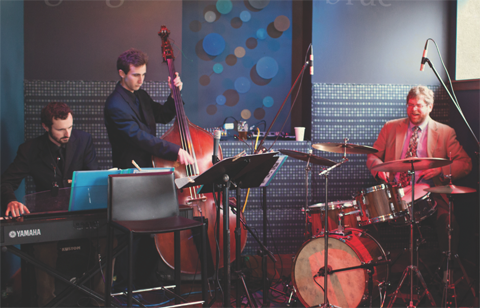
STANDARD ISSUE The piano-bass-drums trio features Emmett Harrity, Nick Merriam, and Rob Schreiber. |
Full disclosure: I hired Standard Issue to play my grandmother’s 80th birthday party. Gram and the gang loved them. So did I.
Of course, Jo Stafford’s cut of Jimmy Van Heusen and Johnny Burke’s “It Could Happen to You,” which appears on Standard Issue’s brand-new The Very Thought of You, was a top 10 hit in 1944, the year both my grandparents graduated college. I’ll have to ask Gram sometime if that song is more equivalent to “Macarena” or “Ironic,” the 1996 hits that helped me usher out the university years (I had to look that up — I remember nothing of either tune, for a variety of reasons).
There’s no question that Rob Schreiber’s Standard Issue play the hits. A classic jazz trio in the Bill Evans mold, piano/bass/drums, they call to mind smoky, dark bars with candle-lit tables and servers who bring drinks on plastic circular trays. And Standard Issue join the ranks of Sinatra, Miles Davis, Rosemary Clooney, Nat King Cole, and Dave Brubeck in laying down a version of “It Could Happen to You.” (This song is everywhere. Heck, it made the Walking Dead soundtrack.)
With no singer, though, and with the barest of arrangements and subtlest of dalliance with melody, the trio don’t necessarily bowl you over with recognizable tunes. You know that hook in “It Could Happen to You.” You could sing it right now. But you don’t ever hear it in the Standard Issue version.
Pianist Emmett Harrity is a cagey player. While dominating the overall direction of each song, he remains unpredictable and slippery. His phrasings are playful and bouncy, generally upbeat even in sugary songs, and with a light touch. Nick Merriam picks his spots on the bass, often taking deep breaths and then bounding back in with a flurry of notes. Schreiber seeps in around them like fog, with lots of circling brushes on the snare and a delicate hand on the cymbals.
What’s maybe most impressive is how relaxed they are in their efforts. There must be an inclination to really powerhouse some of these songs, but the trio are truly reserved. It’s sort of like no one’s ever in charge of the melody. Each instrument sketches out phrases like stencils you paint through in succession, and they line up to create a picture you couldn’t have predicted from any of the three in isolation.
Still, there’s plenty familiar here if you’re a fan, like Gram, of the American Songbook. Diana Krall has a pretty famous version of Brooks’ Bowman’s “East of the Sun,” more sultry than Standard Issue’s take, where Harrity and Merriam elbow each other aside a few times and Schreiber mostly stays out of the way. There aren’t too many listeners who won’t recognize Henry Mancini’s “Moon River,” here elegant and charming, just like Audrey Hepburn in the movie that made it most famous, Breakfast at Tiffany’s. That movie version was full of strings and sappy oboe and clarinet; this take is crisp and full of divergent improvisations.